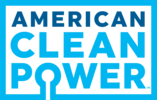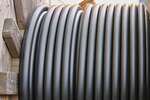News Release from American Clean Power Association (ACP)
Wind Industry Profile of
12/08/2011
AWEA - Newman misleads on wind energy incentives and more
Dear AWEA Members,
Some facts he neglects to mention about Alex Nemann and his comments in the New American magazine:
Older wind turbines are being replaced with new, more efficient models: While there are still a number of 1980s-vintage turbines in the three California passes--Altamont, Tehachapi, and San Gorgonio--where the first commercial wind farms were installed, many are scheduled for replacement with newer, more modern turbines (wind farm "repowering") during the next few years. For example, NextEra Energy will be repowering Altamont wind farms containing 4,000 turbines by 2016 and enXco, another owner of projects in the pass, has said it intends to follow suit.
Wind power needs a federal incentive to help it continue creating manufacturing jobs: American manufacturing jobs are coming back, with tens of thousands of new jobs from wind power. But these jobs could vanish if Congress allows the current incentive for wind, the Production Tax Credit (PTC), to expire, in effect enacting a targeted tax increase, crippling an American manufacturing success story and sending our jobs to foreign countries. With a job-killing tax increase on the horizon and the PTC's future uncertain, businesses are hesitant to plan future U.S. wind farm projects, American manufacturers have seen a drop in orders, and layoffs have already started. For the purposes of the American wind energy industry manufacturing sector, which needs lead time to make its products, the PTC effectively expires at the end of this year.
Variable electric generation from wind farms can be integrated readily into utility systems: Utility system operators already deal regularly with massive swings in electricity demand and in the output of conventional generators. Also, the amount of electricity generated by wind farms changes slowly and predictably; failures at conventional (nuclear and fossil-fueled) power plants occur instantaneously without warning. The fast-acting reserves utility system operators must have on standby 24/7/365 for conventional outages typically cost dozens of times more than the slower-acting reserves needed for wind’s variability. It is more appropriate to talk about the need to back up large conventional power plants than about backing up wind power.
Wind farms are not a major source of bird fatalities: The wind power industry deeply regrets the fact that birds occasionally collide with wind turbines, and strives to minimize such events. Wind power has modest impacts on wildlife compared to other forms of energy generation and causes of mortality, such as buildings or communication towers, and the wind energy industry does more to study, monitor and mitigate for the modest impacts it has than any other sector.
Wind farms are good for public health: Independent studies conducted around the world have consistently found that sound from wind farms has no direct impact on physical health. Typically, two people can carry on a conversation at normal voice levels even while standing directly below a turbine. As an energy source that emits no air or water pollution and creates no hazardous waste, wind energy is essential to reducing public health impacts from the energy sector.
Kind regards
Tom Gray
The aforementioned press release does not reflect the opinion of windfair.net, but is merely published to inform AWEA members and readers of the www.awea.org/blog
Some facts he neglects to mention about Alex Nemann and his comments in the New American magazine:
Older wind turbines are being replaced with new, more efficient models: While there are still a number of 1980s-vintage turbines in the three California passes--Altamont, Tehachapi, and San Gorgonio--where the first commercial wind farms were installed, many are scheduled for replacement with newer, more modern turbines (wind farm "repowering") during the next few years. For example, NextEra Energy will be repowering Altamont wind farms containing 4,000 turbines by 2016 and enXco, another owner of projects in the pass, has said it intends to follow suit.
Wind power needs a federal incentive to help it continue creating manufacturing jobs: American manufacturing jobs are coming back, with tens of thousands of new jobs from wind power. But these jobs could vanish if Congress allows the current incentive for wind, the Production Tax Credit (PTC), to expire, in effect enacting a targeted tax increase, crippling an American manufacturing success story and sending our jobs to foreign countries. With a job-killing tax increase on the horizon and the PTC's future uncertain, businesses are hesitant to plan future U.S. wind farm projects, American manufacturers have seen a drop in orders, and layoffs have already started. For the purposes of the American wind energy industry manufacturing sector, which needs lead time to make its products, the PTC effectively expires at the end of this year.
Variable electric generation from wind farms can be integrated readily into utility systems: Utility system operators already deal regularly with massive swings in electricity demand and in the output of conventional generators. Also, the amount of electricity generated by wind farms changes slowly and predictably; failures at conventional (nuclear and fossil-fueled) power plants occur instantaneously without warning. The fast-acting reserves utility system operators must have on standby 24/7/365 for conventional outages typically cost dozens of times more than the slower-acting reserves needed for wind’s variability. It is more appropriate to talk about the need to back up large conventional power plants than about backing up wind power.
Wind farms are not a major source of bird fatalities: The wind power industry deeply regrets the fact that birds occasionally collide with wind turbines, and strives to minimize such events. Wind power has modest impacts on wildlife compared to other forms of energy generation and causes of mortality, such as buildings or communication towers, and the wind energy industry does more to study, monitor and mitigate for the modest impacts it has than any other sector.
Wind farms are good for public health: Independent studies conducted around the world have consistently found that sound from wind farms has no direct impact on physical health. Typically, two people can carry on a conversation at normal voice levels even while standing directly below a turbine. As an energy source that emits no air or water pollution and creates no hazardous waste, wind energy is essential to reducing public health impacts from the energy sector.
Kind regards
Tom Gray
The aforementioned press release does not reflect the opinion of windfair.net, but is merely published to inform AWEA members and readers of the www.awea.org/blog
- Source:
- American Wind Energy Association
- Author:
- Posted by Trevor Sievert, Online Editorial Journalist / By Tom Gray, www.awea.org/blog/
- Email:
- windmail@awea.org
- Link:
- www.awea.org/...
- Keywords:
- wind, wind energy, wind turbine, rotorblade, awea, ewea, wind power, suppliers, manufacturers, trevor sievert



























